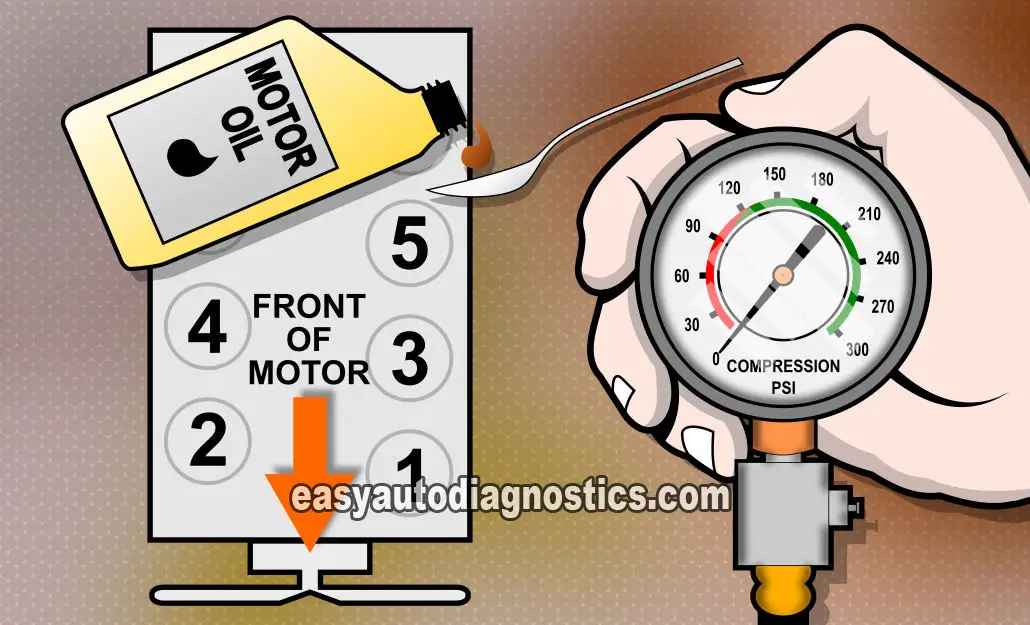Interpreting Your Compression Test Results
If you're reading this section, then your compression test results indicate that one or more cylinders have given you a low compression value.
Up to a certain point, a low compression value may be nothing to worry about. But, if the compression value is too low, compared to the highest compression reading you got, this could be the causing a misfire problem and a misfire trouble code.
It's not unusual for the cylinders to wear out unevenly, especially on high-mileage engines or engines that didn't get a lot of maintenance.
So in this section, I'm going to explain how you can find out if that low engine compression value is causing a problem or not.
OK, you can do this one of two ways: You can calculate this 15% difference with pen and paper or you can use my low compression calculator. You can find the low compression calculator here: Online Low Engine Compression Calculator.
If you want to manually calculate the 15% difference, here's what you'll need to do:
- STEP 1: Multiply the highest compression value by 0.15 (this is the decimal value of 15%).
- STEP 2: Round the result to the nearest one (for example: 25.6 would become 26).
- STEP 3: Subtract the result (the number that was rounded) from the highest compression value.
- ANSWER: The result of this subtraction is the lowest possible compression value any cylinder can have.
Now, let me give you a more specific example: Let's say that I got the following compression values:
| Cylinder | Pressure |
|---|---|
| #1 | 165 PSI |
| #2 | 95 PSI |
| #3 | 155 PSI |
| #4 | 175 PSI |
| #5 | 165 PSI |
| #6 | 180 PSI |
| #7 | 175 PSI |
| #8 | 165 PSI |
My next step is to do the following calculation:
- STEP 1: 175 x 0.15 = 26.25.
- STEP 2: 26.25 = 26 (rounded to nearest one).
- STEP 3: 175 - 26 = 149.
- ANSWER: 149 PSI. Any cylinder with this compression (or lower) value will misfire.
Since cylinder #2 is only producing 95 PSI, I can now conclude that it's 'dead' and causing a misfire.
To find out if the lowest compression value you got from your engine compression test is within a good range, you'll need to do the same calculation. Of course, you'll need to use the highest compression value you got and not the one in the example.
Once you've found the 'dead' cylinder, the next step is to find out what's causing the low compression value. For this step, go to: TEST 2: 'Wet' Engine Compression Test.
TEST 2: 'Wet' Engine Compression Test

A 'Wet’ compression test will help you to find out if the low cylinder pressure or pressures you recorded in the 'Dry' compression test are caused by worn piston rings or worn cylinder head valves.
The 'Wet’ compression test is done exactly the same as the 'Wet' compression test, the only major and significant change is that you'll add a small amount of engine oil (about 1-2 teaspoons) to the cylinder, that had low compression, to create temporarily seal.
Depending on whether the compression pressure rises (on your compression tester) or not, you'll be able to say that the problem lies in the piston's rings or in the cylinder head valves.
OK, this is what you need to do:
- 1
Add a small amount of engine oil to the cylinder that reported low compression or no compression in the 'Dry’ compression test.
The amount should be about 1 to 2 tablespoons of oil. - 2
Install the compression tester onto the cylinder.
Do not use any type of tool to tightened the compression tester. Hand tight is fine. - 3
When all is set up, have your helper crank the engine.
- 4
You'll get one of two results:
1.) The compression value will go up (from the one you recorded before).
2.) The compression value will stay the same.
Let's take a look at what your test results mean:
CASE 1: The compression value shot up. This tells you that the piston compression rings are worn out and thus the low compression problem is in the bottom end.
If you're wondering why the compression value shot up, it's because the engine oil that you added (to this low compression cylinder) helped the piston compression rings seal the compression within the cylinder. The end result being that your compression test gauge registered a higher compression value.
CASE 2: The compression value stayed the same. This confirms that the problem is in the cylinder head valves.
No, if you're wondering why this means that the cylinder head valves are worn, here's the answer: It's due to the fact that engine oil can not help worn cylinder head valves seal the compression within the cylinder. So, if the compression value did not shoot up (from the result obtained in TEST 1), then you can conclude that the problem is in the cylinder head valves of that dead cylinder.
More 4.8L, 5.3L, 6.0L Tutorials
You can find a complete list of 4.8L, 5.3L, and 6.0L test articles here: GM 4.8L, 5.3L, 6.0L Index Of Articles.
Here's a list of articles you'll find there:
- Blown Head Gasket Test.
- How To Test The Crank Sensor (at: troubleshootmyvehicle.com).
- How To Test The MAF Sensor.
- How To Test The COP Coils.
- Electronic Throttle Control Test Basics.

If this info saved the day, buy me a beer!

